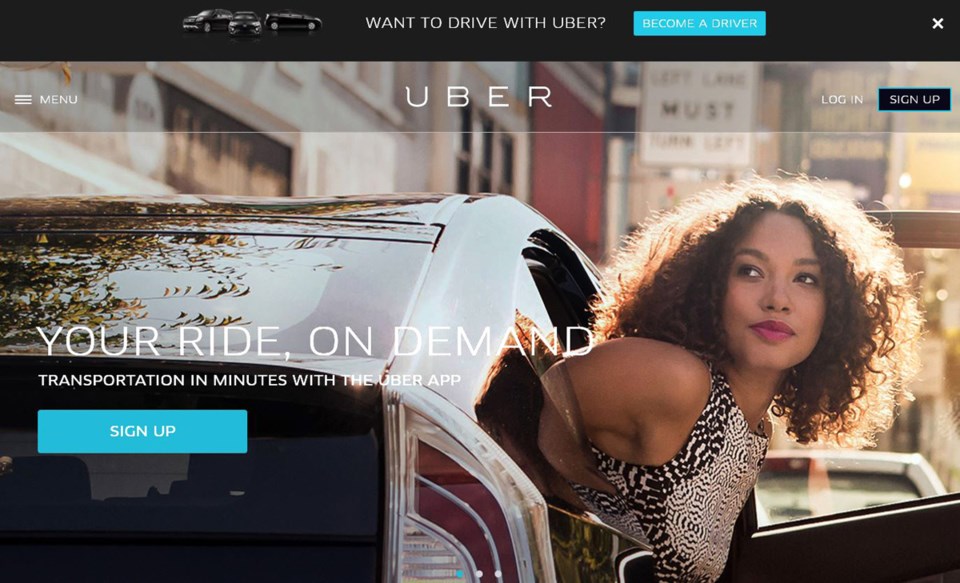It seems as if Uber will soon be upon us.
Despite Vancouver city council upholding a moratorium on new taxi licenses — including those that could potentially cover Uber — the province's ruling party appears to be readying the welcome mat for the startup and the rest of the so-called sharing economy.
For weeks now, poll-style ads for the Liberal Party of B.C. have been populating my social media feeds, asking me — and presumably every other Internet-savvy person — whether it's time to welcome services like Uber, Airbnb and Lyft. That respondents have the option of clicking only “yes” or “not sure” should tell you plenty about the predetermined outcome. (Those seeking more proof need only look to Transportation Minister Todd Stone's 180-degree reversal on his opposition to the startup last week.)
The Liberal Party's peppy ads tout the benefits of the sharing economy: “Flexible hours to supplement your income; renting a room to help pay a mortgage; saving money for you and your family.” But really, it's an if-you-can't-beat-'em-join-'em scenario. Uber's entrance into our marketplace is inevitable.
We are hurtling towards a less formalized status quo in our globalized economy where a free marketplace is mediated only by the touch of a button and services must meet real-time demand or quickly become passé.
Young people are embracing the instant gratification and Wild West appeal of this economic model. I can't remember a weekend in recent memory where someone hasn't lamented the lack of options such as Uber or Lyft. And as I've written before, Airbnb has become a lifestyle-saving grace for a certain subset of renter, despite the havoc it may or may not be wreaking on rental stock.
On the face of it, it makes perfect sense, morally, financially and environmentally, for my community-minded generation to shell out a few bucks to catch a ride with a neighbour rather than wait for a taxi or to stay in a real person's home rather than book a hotel. But we may be setting ourselves up for a bigger economic fall by doing so.
Because the business model Uber employs isn't based on sharing at all but on the back of the gig economy — the march toward precarious temporary, part-time or contract jobs that have destabilized the incomes and the lives of nearly a third of all workers in Canada, mostly younger people, immigrants or otherwise marginalized groups.
Over the past several decades, we've seen a marked shift away from permanent jobs with predictable incomes, benefits and pensions, and toward a freelance economy that is increasingly predicated on independent contractors bearing all the risks and costs associated with their work. This is happening across nearly every industry, but nowhere is it so blatant as with Uber.
The company all but abdicates responsibility for the safety or security of its drivers, who must provide their own vehicles, insurance, gas and iPhones to connect to the app, while its aggressive lobbying efforts and undeniable market appeal force jurisdictions to draft bespoke policy to support it.
And while the flexibility and freedom the company provides is undoubtedly appealing, the potential financial gains for drivers have been vastly overstated. In many cities where the service has launched, seasonal fare cuts and flooded markets result in rather paltry pay, so much so that Uber has conspicuously stopped making claims that average drivers in certain markets earn as much as $74,000 to $90,000 a year.
Objective data is hard to come by, but a recent story from a Philadelphia-based reporter found that, after expenses and Uber's cut, her earnings were less than $10 an hour. The company is also heavily invested in driverless car technology, hardly making it a reliable long-term provider of the kind of good jobs Christy Clark's government likes to promise it is working to provide.
In the sudden push to roll out the welcome wagon for Uber and its ilk, there is much more to consider than the impact on the taxi industry, our own regulatory framework or the potential to beef up personal earnings. There are profound questions at play about the devaluation of labour and the implications of an economy increasingly founded on piece work. Additionally, the provincial government, in its newfound enthusiasm for this job-creation model, would do well to consider just why it is more and more British Columbians are seeking ways to supplement their incomes, find quick mortgage helpers and save money for their families in the first place.
It's a problem that isn't unique to B.C. It didn't start with Uber and it won't end there. Figuring out a way to balance shifting market expectations with our long-term economic interest is a challenge that is only going to become more pressing and complex. Because while the Ubers of the world can change course at a moment's notice, the implications of their disruptive economic influence — positive or negative — will be shared by all of us for years to come.
Jessica.Barrett@gmail.com
@jm_barrett



